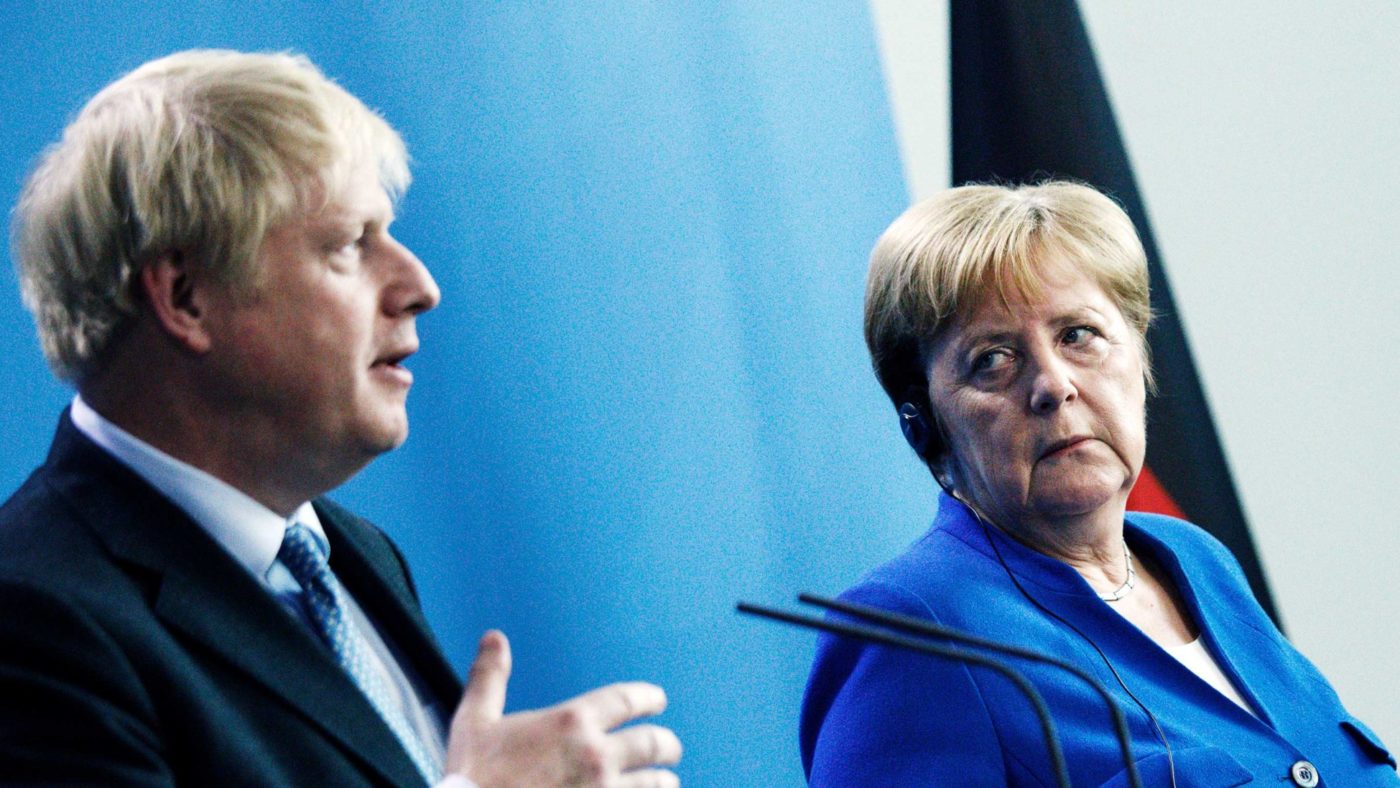It has not yet been a week since the Conservative Party Conference and yet the ongoing debate over the backstop has already seen two potentially crucial inflection points.
First, the Democratic Unionists caved on their previously steadfast refusal to countenance any regulatory border between Ulster and the mainland when they backed Downing Street’s ‘final offer’, which included regulatory alignment.
Then we had yesterday’s explosive leak about the alleged contents of a telephone call between Boris Johnson and Angela Merkel. Whatever the actual contents of the conversation, the fact that a ‘Downing Street source’ chose to present it as a blunt call for the de facto annexation of part of the UK by the EU was a notable hardening of tone.
It is impossible to be absolutely certain about the true state of the negotiations. There is always a chance that one or both sides is bluffing, or that back-channels are working furiously towards an agreed solution, or that the Government really does have a get-out-of-jail-free constitutional wheeze up its sleeve to circumvent the Benn Act and deliver Brexit on October 31st, as it continues to insist it will.
But setting aside that caveat, it seems fair to judge that the negotiations are in a dire position, caught between a Parliament which insists on stripping the Government of its freedom of manoeuvre and a Northern Irish question which looks increasingly insoluble.
Why insoluble? Because, despite the attempts of some expert technocrats to insist otherwise, London and Brussels are still talking past each other on the question of the backstop.
Nothing better illustrated this than Prosperity UK’s panel at Conservative Conference, hosted by ConservativeHome, on the findings of their ‘Alternative Arrangements Commission’. Whilst this isn’t the place to go into detail on their recommendations – you can read the full report on their website – two things leapt out which cut to the heart of the current crisis.
Shanker Singham, one of the technical experts who contributed, was very clear that the proposal involved no ‘unicorn technology’. Although nowhere has yet combined all the remedies they outline in one place, each is in operation somewhere and, he claimed, their “workability” had not been challenged.
Yet Greg Hands, one of the Conservative MPs who has provided the Commission’s political leadership, said that they had nonetheless received an extremely tepid response from Dublin – especially in the wake of the Benn Act. He claimed that whilst the Irish Government might have been prepared to consider the proposals as an alternative to No Deal, they were not prepared to discuss them as an alternative to the backstop.
The crucial point highlighted by these two interventions is that contrary to what some technocratic observers insist, the Northern Irish question is not simply a technical dispute about how best to achieve agreed policy goals. Rather London and Dublin (and thus, by extension, Brussels) have very different conceptions of what represents an acceptable minimum level of north-south continuity post-Brexit – differences which call into question the fundamental coherence of the European project and/or the British nation-state.
Contrary to their own initial insistence, both Johnson and the DUP have given serious ground. I have written elsewhere about the danger their new position poses for the Union. The EU clearly anticipates that, when pressed, they will concede even more, and it is not entirely unreasonable to suppose that Johnson’s charm, which works most potently on Tories, might be used to bring his Party to Brussels rather than vice versa.
But given the monstering they have received in recent days, where is their incentive for further compromise?
Sun Tzu advises aspiring strategists to build their opponents a golden bridge over which to retreat. In political terms, this means that the best way to get Johnson to capitulate would be to make him look like a conquering hero as he did so.
By rubbing his face in the Government’s concession, the EU will not, at the very least, have increased the Prime Minister’s openness to further retreat. Indeed, they might bolster at least the short-term political case for striking a Churchillian pose – something Johnson likely needs no encouragement to do.
Meanwhile the DUP are being savaged on both sides by rival unionist parties for conceding on divergence. Party strategists with long memories will be particularly discomfited by the sight of the Ulster Unionists hammering them for compromising the integrity of the Union – because this is exactly what the DUP did to supplant the UUP as the pre-eminent party of Northern Irish unionism in the wake of the Belfast Agreement.
Despite the loss of the Government’s working majority, the DUP’s position continues to matter because both ministers and a significant bloc of Conservative MPs have set the acquiescence of the Unionists as a condition for their supporting a deal. It remains extremely difficult, for all the nonsense talked about Brexiteers being ‘English nationalists’, to imagine the Government ramming a mainland-only Brexit through.
As a consequence, it is very difficult to see what the Government’s pathway to a deal is – at least prior to a general election victory which would allow them to set aside the Benn Act (or the next Benn Act) and put No Deal back on the table.
But with MPs such as Nick Boles being quite open about their intention to refuse an election until the Government will lose it, we may be trapped in this purgatory for some time yet.
CapX depends on the generosity of its readers. If you value what we do, please consider making a donation.


